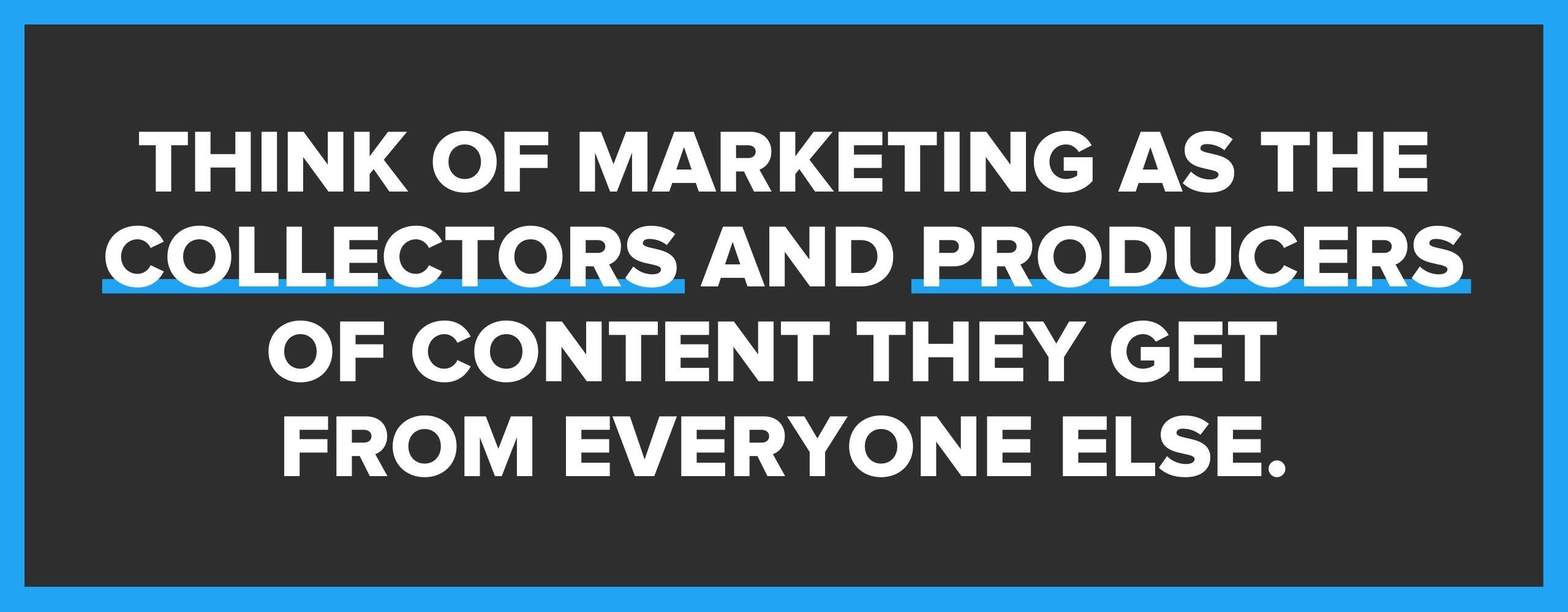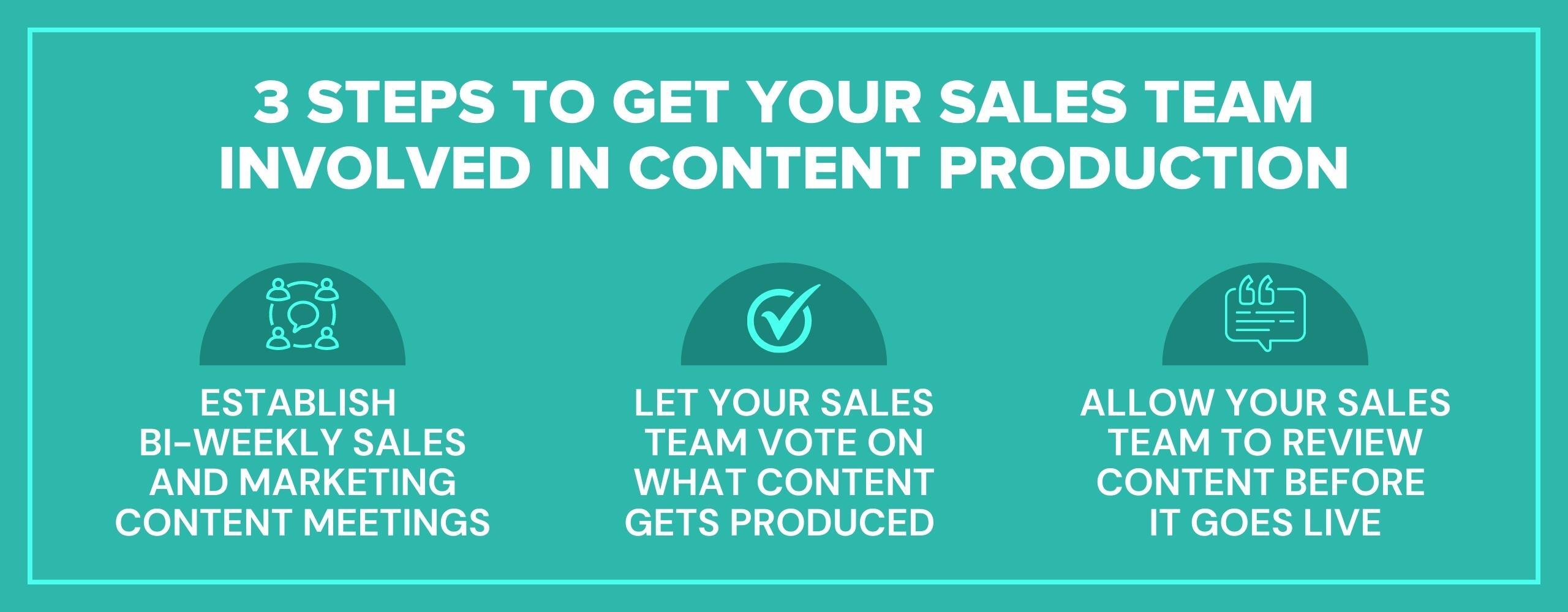Subscribe now and get the latest podcast releases delivered straight to your inbox.
Content Marketing Will Fail Without Help From The Sales Team
.png?width=50&height=50&name=Anj%20Profile%20Pic%20(6).png)
Jan 4, 2024

“Content is a marketing thing.”
I hear this all the time from companies, and I understand why they say it, but to me, this is a very limiting mindset. And if you’re thinking this way, it’s only going to hold you back.
While it’s true that the marketing team is generally responsible for producing content — that is, articles, ebooks, emails, videos, and similar materials — these are assets for your customers, and they shouldn’t be seen as belonging to just one department.
Here’s a better way of thinking about it:
Instead, think of your marketing team as the collectors and producers of content they get from everyone else: sales teams, customer service teams, product developers, you name it.

When you have this new mindset, that content comes from everyone, your output will improve drastically. You’ll get authentic, buyer-focused content from your knowledgable people — packaged with the finesse and skill of the marketing team.
So, how do you do it?
Below, I’ll explain how we get our clients to shift their focus so they no longer see content as just a marketing thing.
It starts with your sales team.
Your greatest content asset is your sales team
For all their market analysis and insight, your marketing team is not your greatest content production asset. Your sales team is.
Your salespeople are the ones speaking directly to buyers every day. They’re the ones hearing the worries, questions, and concerns of late-stage buyers who are deciding whether to make a purchase or not. They're the ones who know, ultimately, why someone didn't buy from you.

They hold the key to making your content more in line with what your customers want.
But at the same time, your sales reps are busy.
They’ve got quotas to hit and meetings to book, and they’re going to be skeptical about giving up their time to help with what they see as a marketing thing.
So, if you’re a marketing VP or a business leader looking to bring the sales team into the content production process, it’s helpful to anticipate their objections ahead of time so you’re prepared to get them on board.
Why salespeople object to helping with content
Good sales reps guard their calendars. They know when prime selling time is, and they loathe to give it up. if you ask salespeople to help with content, you will likely hear the same four objections:
- "I don't have the time."
- "It's not my job."
- "Helping with content won't help me sell more."
- "I've never done this before and I've done well."
These are valid concerns, and we want to be respectful of their boundaries. So, we'll have to explain the value of what you’re going to ask them to do. If you want them to comply, you’ll have to address their objections. Here’s how our clients respond to their sales teams:
- ‘I don’t have time.’
I know how valuable your time is, and we wouldn’t ask you to give it up if it weren’t important. We only need 30 minutes every two weeks. And we can work around your schedule.
- ‘It’s not my job.’
When a buyer comes to you and hears something different than what she’s read on our website, that creates a jarring experience and makes that person less likely to close. The more aligned you are with our marketing, the better the customer experience. Marketing will still be in charge of producing all the content, we just want your input to make sure we're hitting the mark. After all, you understand our buyers better than anyone, so we can't do this without you.
- ‘Helping with content won’t allow me to sell more.’
If you share your expertise, our content will be better. Better content will create better sales interactions. Your close rate will go up and your sales cycle length will go down, both of which will help you meet your quotas and earn a better commission. - ‘I’ve never done this before and I’ve done well.’
That’s true, but the same could be said by anyone in the past who’s been uncertain about trying a new approach. Just in the past few years, you’ve adapted to using a CRM and selling on Zoom, both of which you’d never done before. And you’re a better sales rep because of it.
I’m not going to pretend it’s going to be as easy as that, but you get the idea. I promise that the benefits of getting your sales team on board will be worth it — and they will (eventually) thank you.
3 steps to get your sales team involved in content production
So that’s the why. Now for the how.

To get your sales reps more involved in the content your business produces, follow these three steps.
1. Establish bi-weekly sales and marketing content meetings
As I said above, these only need to be 30 minutes in length. An hour, tops.

The purpose of these meetings is to connect your sales team to the content that’s being produced. For too many companies, blog, social, and video content never gets seen by the company itself, which pushes the marketing team farther and farther away from the core work of the business.
A bi-weekly meet-up will solve this. In 30 minutes, members of the marketing and sales teams will work together, which counteracts the tendency toward siloing.
Here’s a simple agenda:
- Spend 10 minutes going over content that’s been published since the last meeting.
- Spend 15 minutes of content brainstorming
- Spend 5 minutes of content priority voting (explained below)
You will be amazed at how quickly these meetings pay you back in terms of value.

They represent an important first step in aligning your sales and marketing teams.
2. Let your sales team vote on what content gets produced
We’ve created this sales content sandbox spreadsheet tool to help sales reps upvote the content they think is most important.
Here’s how it works:
First, the content manager collects topics from the sales team. For each topic, you should include:
- The topic, phrased as a question in the words of the buyer
- Whether the output should be a blog article, a video, or both
- Which sales rep is making the request
- The ideal subject matter expert to answer the question
- Why the topic is being requested
Next, sales team members can prioritize each topic by “upvoting” the ones they want, and the spreadsheet will automatically sort the topics with the highest votes to the top.
Also, the color of the rows will be updated based on the status column. Again, it makes it easy visually for people to understand where everything stands without a lot of hands-on work.
We developed the tool so sales team members could communicate content priorities in real-time as ideas came up, so you might find your team using it outside of the meeting.
3. Allow your sales team to review content before it goes live
At IMPACT, we have a ‘content review’ Slack channel where rough drafts of articles and early-cut videos get posted for feedback. This is an open channel that gets a lot of attention during the day.
Here’s the thing, we don’t require anyone outside the marketing team to give feedback, but we welcome feedback from all — and we normalize the process.
Some of our clients will have watch parties before a new video goes live. This way, sales teams know exactly what’s in each video (and they can brainstorm together about how they’ll use it with clients).
And, if you worry that pre-launch feedback will slow things down, you can always publish a monthly content newsletter that covers what’s been published, success metrics, and anecdotes of how individual pieces of content have helped your bottom line.
Content is everyone’s problem opportunity
As Marcus Sheridan often says, content is the soul of your business. While marketers are the ones who will produce that content, they can’t do it in a vacuum. Instead, we need to think of marketers as the ones who collect and polish the ideas they get from other core experts on the team. First on that list should be the sales team. That first-hand knowledge of your buyers is invaluable.
The first step is inviting these people into the process. Let them contribute, let them vote on what’s coming out. Make it actually feel like they’re involved in a meaningful way.
When you’re ready to learn more about using content in the sales process, you can check out this free course on IMPACT+, our learning platform: The Revenue Team Approach to Sales Enablement Content. In it, we walk you through this entire process in more depth.
Or, if you're ready to talk to a coach about bringing your teams together, reach out to an IMPACT expert and see what's possible.


Order Your Copy of Marcus Sheridan's New Book — Endless Customers!